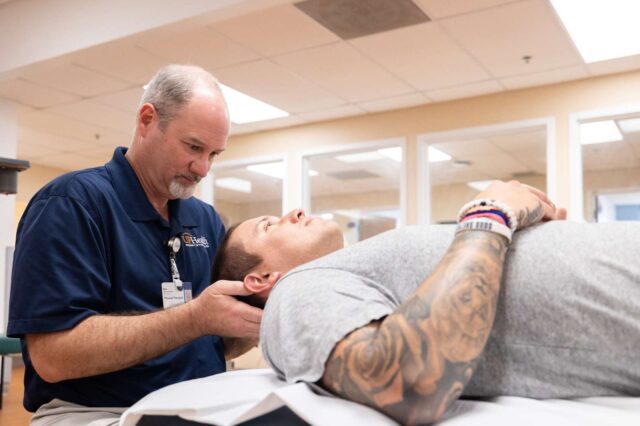Physical Therapy Can Help Headaches
A headache is any type of pain or discomfort that occurs in the face or head due to irritation of pain nerves. Current estimates show that approximately half…

Update your location to show providers, locations, and services closest to you.
Migraines are recurring headaches that can cause severe discomfort and throbbing pain. The duration of each episode can range from four to 72 hours. Many patients experience a range of other symptoms in addition to the headache including nausea, light and noise sensitivity, or vomiting. Depending on the level of symptoms and how often these headaches occur, migraines can be debilitating.
Our neurologists — with expertise on treating headaches — are here to help. With medication management, these specialists can combat the frequency and duration of your migraines, with the ultimate goal of helping you to become migraine free. We see patients with difficult-to-treat migraines, and are committed to delivering effective care in a compassionate setting.
• Although the cause of migraines is not known, researchers believe there are genetic as well as environmental components.
• About 25% of patients experience a visual disturbance called an aura prior to the onset of a migraine. Auras are often described as flashing bright lights, lightning bolts or a kaleidoscope of color that can occur in one or both eyes.
• A thorough patient history and full neurological exam are important tools to diagnose migraines, which present differently from other types of headaches.
• Our specialists can help you identify environmental factors that might trigger your migraines. For some people, the list can include stress, anxiety, chocolate, wine, caffeine, cheese, screen time, strong smells or skipped meals.
After a comprehensive assessment of your symptoms and medical history, our neurologists can create a care plan that best suits your needs. They offer a full range of treatments for migraines, including combination drug therapy and Botox injections.
Medication that can stop a migraine once it has started is referred to as an abortive. In the past decade, more effective medicines have become available that cause fewer side effects. These are used only when needed and taken at the first sign of migraine onset.
When migraine frequency is high with severe, long-lasting symptoms, medications that prevent the onset can be prescribed. They are typically taken daily. Some are once-a-month injectables. Patients are often asked to start a migraine journal so the care team can monitor whether the frequency has decreased with the preventive medications.
Many patients will be prescribed both preventive and abortive medicines to combat their migraines. Although each case is assessed individually, typically Botox injections are used for patients whose chronic migraines have not improved with medication or those experiencing 15 or more migraines a month.
A headache is any type of pain or discomfort that occurs in the face or head due to irritation of pain nerves. Current estimates show that approximately half…

The Haley Brain Wellness Program is an interdisciplinary treatment program for military veterans.
